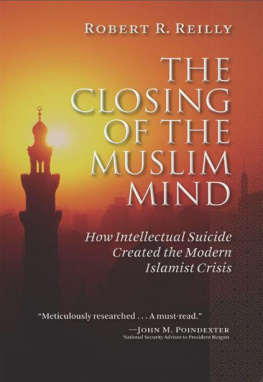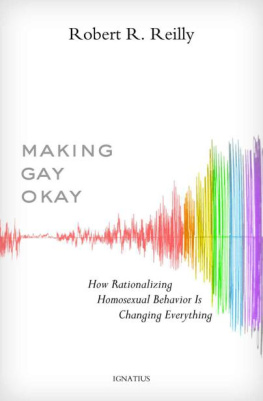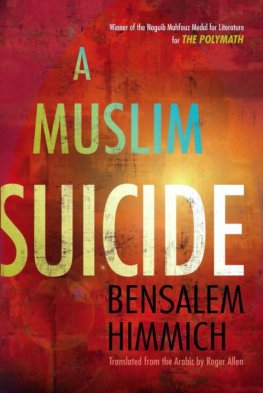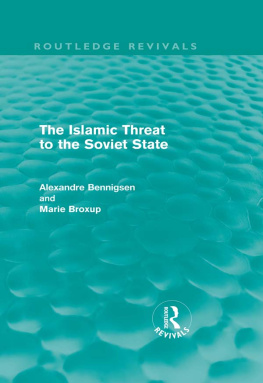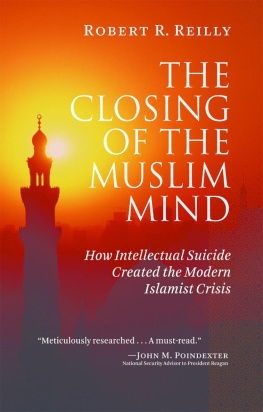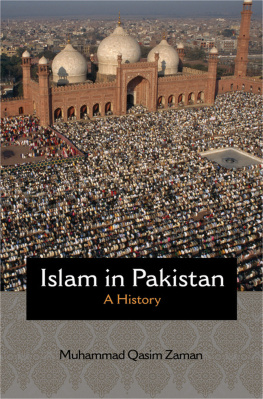THE CLOSING OF THE MUSLIM MIND
How Intellectual Suicide Created the Modern Islamist Crisis
ROBERT R. REILLY

WILMINGTON, DELAWARE
Copyright 2010 by Robert R. Reilly
All rights reserved. No part of this publication may be reproduced or transmitted in any form or by any means, electronic or mechanical, including photocopy, or any information storage and retrieval system now known or to be invented, without permission in writing from the publisher, except by a reviewer who wishes to quote brief passages in connection with a review written for inclusion in a magazine, newspaper, broadcast, or online publication.
Reilly, Robert R.
The closing of the Muslim mind : how intellectual suicide created the modern Islamist crisis / Robert R. Reilly.
p. cm.
ISBN 1-933859-91-1
ISBN 978-1-933-85991-0 (electronic)
1. Islamic countriesIntellectual life. 2. Islamic civilization History. 3. Islamic fundamentalism. 4. IslamDoctrinesHistory. I. Title.
DS36.8.R45 2010
320.557dc22 2009052660
ISI Books
Intercollegiate Studies Institute
3901 Centerville Road
Wilmington, DE 19807-1938
www.isibooks.org
Manufactured in the United States of America
To the courageous men and women throughout the Islamic world, here nameless for reasons of their own security, who are struggling for a reopening of the Muslim mind.
CONTENTS
INTRODUCTION
Intellectual Suicide
CHAPTER 1
The Opening: Islam Discovers Hellenic Thought
CHAPTER 2
The Overthrow of the Mutazilites:
The Closing Commences
CHAPTER 3
The Metaphysics of the Will
CHAPTER 4
The Triumph of Asharism
CHAPTER 5
The Unfortunate Victory of al-Ghazali
and the Dehellenization of Islam
CHAPTER 6
Decline and Consequences
CHAPTER 7
The Wreckage: Muslim Testimonials
CHAPTER 8
The Sources of Islamism
CHAPTER 9
The Crisis
Foreword by
Roger Scruton
T he roots of Western civilization lie in the religion of Israel, the culture of Greece, and the law of Rome, and the resulting synthesis has flourished and decayed in a thousand ways during the two millennia that have followed the death of Christ. Whether expanding into new territories or retreating into cities, Western civilization has continually experimented with new institutions, new laws, new forms of political order, new scientific beliefs, and new practices in the arts. And this tradition of experiment led, in time, to the Enlightenment, to democracy, and to forms of social order in which free opinion and freedom of religion are guaranteed by the state.
Why did not something similar happen in the Islamic world? Why is it that this civilization, which sprang up with such an abundance of energy in the seventh century of our era, and which spread across North Africa and the Middle East to produce cities, universities, libraries, and a flourishing courtly culture which has left a permanent mark on the world, is now in so many places mute, violent, and resentful? Why does Islam today seem not merely to tolerate the violence of its fiercest advocates, but to condone and preach it? Why is it that Muslim minorities in Europe, who migrate in order to enjoy the benefits of a secular jurisdiction, call for another kind of law altogether, even though so few of them seem able to agree what that law says or who is entitled to pronounce it?
In this lucid and fascinating book, Robert Reilly sets out to answer those questions. His purpose is to show that Islamic civilization, which led to the urbane princedoms of Andalusia in the West, and to the mystical laughter of the Sufis in the East, underwent a moral and intellectual crisis in the ninth to the eleventh century of our era, when it turned its back on philosophy and took refuge in dogma. Several factors are responsible for this sudden ossification, but the principal one, in Reillys view, was the rise of the Asharite sect in the tenth century and the defeat of the rival sect of the Mutazalites. The Asharites found a potent voice in the Imam al-Ghazali (d. 1111), a brilliant philosopher and theologian whose tormented spirit found refuge at the last in a mystical oneness with Allah. Human reason teaches us to question things, to discover things, and to make new laws for our better governance. Hence reason was for al-Ghazalithe enemy of Islam, which requires absolute and unquestioning submission to the will of Allah. In his celebrated treatise The Incoherence of the Philosophers , al-Ghazali set out to show that reason, as enshrined in the writings of plato, Aristotle, and their followers, leads to nothing save darkness and contradiction, and that the only light that shines in the mind of man is the light of revelation. Although al-Ghazalis arguments are soundly refuted by Averroes (Ibn Rushd) in his The Incoherence of the Incoherence , Islam rushed to embrace the Asharite doctrine, which made so much better sense of the ruling idea of submission. Averroes was sent from Andalusia into exile, and the voice of reason was heard no more in the courts of Sunni Muslim princes.
The assault on philosophy went hand-in-hand with an equally determined assault on law and jurisprudence (fiqh) . The early Islamic jurists had sought to reconcile the Quran and the traditions with the demands of ordinary justice, and had developed a system of law which could be applied in the developing circumstances of social and commercial life. The interpretation of the law was subject to study and amendment by the individual effort (ijtihad) of the jurists, who were thereby able to adapt the brittle injunctions of the Holy Book to the reality of Muslim societies. In the tenth or eleventh century of our era it became accepted that the gate of ijtihad is closedas al-Ghazali himself declared. Since then Sunni Islam has adopted the official position that no new interpretations of the law can be entertained, and that what seemed right in twelfth-century Cairo or Baghdad must seem right today. Should we be surprised, therefore, if nobody can find a clear way of reconciling the Sharia with the facts of modern life and government, or that a leading jurist from al-Azhar, the ancient university of Cairo, can rule that it is okay for a man and a woman who do not know each other to be alone together, provided he sucks her breasts?
Philosophy and dogma, civil law and divine law, are always hard to reconcile. But in the Islamic world the tension between them has taken on a special character, since it involves a conflict between two rival interpretations of the Quran. On one interpretation, that of the Mutazalites, the Quran was created by God at the moment of its revelation. It therefore stands to be interpreted in terms of the circumstances in which it was revealed, and of Gods purpose in revealing it. On the Asharite interpretation, the Quran is uncreated, being coeval with the Almighty, his eternal word that owes nothing to the contingencies of life in Muhammads war-torn Arabia. Reillys account of this dispute is particularly illuminating, since it suggests how very difficult it will be to secure, in our dealings with the self-appointed leaders of the Sunni community, the kind of flexible interpretations of the faith that would permit the growth of a real and lasting tolerance towards those who reject it.
Reillys brilliant account of the long-term effect of the closing of the Muslim mind makes sobering reading. Muslim societies, as he shows, have rarely adapted to the forms of modern politics, to the outlook of modern science, or to the demands of global migration. If Reilly is rightas he surely isthen the resentment that animates the Islamist terrorist is to be blamed not on our success, but rather on Muslim failure. This failure is not the inevitable result of Islam; rather, it is the effect of an act of cultural and intellectual suicide, which occurred eight centuries ago.

